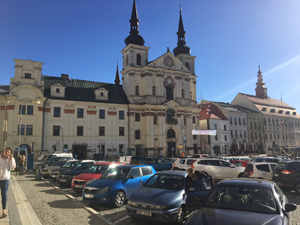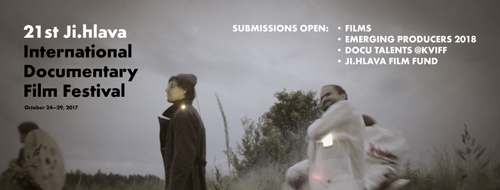
Your complimentary articles
You’ve read one of your four complimentary articles for this month.
You can read four articles free per month. To have complete access to the thousands of philosophy articles on this site, please
Films
Philosopher at a Film Festival
Thomas E. Wartenberg reports from the 22nd Ji.hlava International Documentary Film Festival.
Last summer I received a surprising email. I was asked to be a judge in the ‘Between the Seas’ section of the 22nd Ji.hlava International Documentary Film Festival, which was to be held from the 26th to the 30th of October 2018 in Jihlava, Czech Republic. Although I have attended and presented many talks at many conferences on film and philosophy, this was the first time I had been asked to be a judge at a film festival. I was particularly surprised because most of my work in the area has been on narrative fiction film. Nonetheless I was flattered and intrigued, and so I headed to Jihlava to be a judge.

Jihlava Square, postcard from Thomas Wartenberg
The Ji.hlava International Documentary Film Festival is the largest documentary film festival in Eastern Europe. Over 300 documentaries were screened in 2018, chosen from over 3,500 submissions. Hundreds of people from across Europe attended. There were competitions in such areas as experimental documentaries, Czech films, and debut films, as well as screenings of major documentaries outside of the competitions.
‘Between the Seas’ consisted of two distinct competitions: one for students and one for professionals. The panel consisted of five judges: a Czech film director, a Slovak film producer, a Filipina film producer, a British sound artist, and myself, a philosopher of film. Over the course of four days we had to watch twenty-four films, though not all of them were feature length. At the end of a long fourth day of screenings, we met over a late dinner to decide on which films to award prizes.
A number of films were very intriguing from a philosophical point of view. I was first struck by one of the student films, Ars Moriendi: The Art of Living (Kristina Schranz), an Austrian-German production. The film portrayed a 93-year-old woman who had returned to university after breaking off her education to raise a family. I was amazed that the subject she chose to study was death. The film included brief looks at the views of such philosophers as Martin Heidegger, who wrote extensively about death. But what really impressed me was the style in which it was filmed – with extended long shots taken with a stationery camera that allowed the action to slowly develop. Since it was one of the first I saw, I was excited to realize that many of the films in the competition would be interesting to see.
One of the problems with being judges was that we saw so many films in such a short period of time that we didn’t have the opportunity to reflect as deeply as I would have liked on them. For example, I traveled to the airport at the end of the festival with Hilal Baydarov, a director from Azerbaijan. We had seen two films of his, Birthday, and One Day in Selimpasha. They were very similar, though I liked Birthday better because of the irony its subject matter makes possible. Birthday follows the filmmaker’s mother on her birthday. Given the title, we expect some sort of celebration; but that never happens. Instead we see her cooking her various meals, all of which seem to involve dough of some sort; working outside in her garden; playing cards or a game on her antiquated cellphone; or taking a rest on the couch in her living room. Although the film was not very long (63 minutes), the pressure of watching it with other films before and after made all of us annoyed that it was ‘boring’. It was only in the taxi, when pressed by the director to explain my reaction to his film, that I began to realize that the boredom of everyday life was the subject. He wanted his audience not simply to become bored, but to reflect on boredom as a philosophical topic. A light went on in my head as I realized that we had watched a cinematic equivalent to Albert Camus’ The Myth of Sisyphus.

Festival flyer
A film that impressed me both for its style and its content was The Good Death (Tomas Krupa). It focused on the decision made by a wealthy British woman suffering from muscular dystrophy to end her life. Having watched her own mother endure a protracted death during which she had become unable to communicate at all, she wished to avoid such a fate herself. Physician assisted suicide is illegal in Britain, so she traveled to Switzerland to arrange it. The film begins about six months beforehand, as we watch her making all the necessary arrangements, including telling her two children and her friends, arranging her finances, and taking care of her two homes. I was struck by seeing someone so clear in her determination to deal with so many difficult issues: her daughter is pained at the prospect of her mother’s suicide, for example, and tries to convince her not to do it. The film ends when she flips the switch that allows the sedative to course through her veins, causing her to fall asleep. Her death is not far off.
This film clearly had a message: People should be allowed to choose to die with dignity. It made a persuasive case for this, in my opinion qualifying it as a film that presented a philosophical argument. The other judges, however, didn’t like the film. They had various reasons for this. Some thought it ‘too Hollywood’ – one of the reasons I liked it. High production values reminiscent of Hollywood cinema seemed exactly the right choice. Given its message, it seemed important to me that the film strive for a wide audience. One of the other judges said he felt manipulated by the film. I take it that what he meant was that the film had a clear message that it intended to impart to its audience. From my point of view, that was another one of the film’s virtues. But my fellow judges disagreed, and the film did not win the prize I thought it deserved.
This segues into a discussion of serving as a judge at the film festival. While it was an interesting experience, it was also frustrating. Whenever there was a disagreement, I found myself on the losing side. I now think that the issue was that the filmmakers on the panel were less interested in the content of the films than in their style. That is, they were judging the films from the point of view of their form. Were they shot in an interesting manner? Were they innovative? I, on the other hand, tended more to think about the content. I was impressed by films that I felt had a real message to convey and did it well. Another difference, I think, was that the two winning films – Timebox (Nora Agapi), a film about contemporary Romania that won the prize in the main competition, and Heavy Metal (Eugene Golovanevsky), a Ukrainian film about a group of men illegally disassembling an abandoned factory building to sell the parts for scrap – were Eastern European films, whose subject matter was particularly interesting to Eastern Europeans, and thus to two of the judges. It’s not that I disliked those films, it’s just that I didn’t think they were as interesting as some of the others.

Scene from The Art of Living
I had previously served on panels where we had to award a prize, but those panels all involved judging written work, and our discussions were always conducted virtually. Judging a group of films with a group of artists and filmmakers was a new experience particularly because we were all sitting in a room to do the judging after having spent virtually all of four days sitting together in theaters watching films. Also, the time pressure precluded our discussing in any depth the criteria we were using. Nonetheless, and despite the issues I have raised here, I found it an energizing and fascinating experience.
Watching so many documentary films in such a short time period also led me to reflect on some of what appear to be standard features of contemporary documentary filmmaking. Many of the best films in the festival were, in effect, personal essays, in which the filmmaker’s presence was central to the story they told. One very personal film about the filmmaker’s father being forced out of his apartment by local government so that the building could be renovated, The Last Self-Portrait (Marek Kubos), a Slovak film, highlighted in a humorous yet serious manner the filmmaker’s reflections about making documentary films and the moral compromises they involve. These highly personal films had an impact that many of the more ‘objective’ films, say about the dismantling of a greenhouse and the firing of the elderly woman who had run it for decades, failed to achieve. While such films may not achieve wide distribution, they are truly great achievements that deserve a wider audience than they are likely to have. However, one troubling tendency present in many of the films was a reticence about providing any verbal information, either through voiceover or writing on the screen, to set a context for the audience to help them understand what they would see. It seems a dogma of contemporary documentary filmmaking (at least of the sort dominant in the festival) to simply thrust the audience into a situation and let them slowly come to understand its significance. I think this tendency resulted in needless obscurity in many of the films I saw at the festival. In many cases, the information that would have helped was eventually presented – usually through titles at the end of the film.
Clearly, documentary filmmaking is alive and well, at least in Eastern and Central Europe. I am very grateful for the opportunity to have become acquainted with such a vital area of contemporary filmmaking which most Americans, and, perhaps, Western Europeans and audiences in other areas of the globe, are mostly ignorant of. Seeing so many excellent films produced in the last year by filmmakers had a major impact on me. I hope that at least some of these films achieve the wide viewing they deserve.
© Prof. Thomas E. Wartenberg 2019
Thomas Wartenberg is the author of Thinking on Screen (Routledge). He is a Professor Emeritus of Philosophy at Mount Holyoke College, MA.






